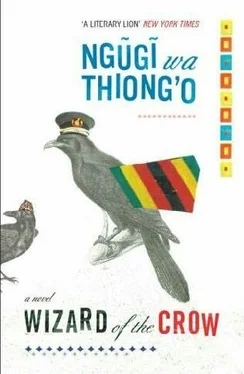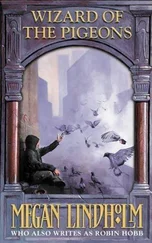They decided to go back to Santalucia. But before they had gone too far, they heard steps behind them. It was one of the garbage collectors.
“I have decided to leave the earthly brooms behind to become a cleaner of the hearts of men. I too want to become a Soldier of Christ,” he told them.
The Soldiers of Christ were amazed at what had just unfolded before them. God works in mysterious ways his wonders to perform. After days of trying without success, now, when they least expected it, in the most unlikely of places, they had just gotten their first convert. They accepted him as their new brother in Christ and they baptized him Sweeper-of-Souls.
And suddenly they saw the light of their next act and within seconds, accompanied by their new convert, they were on their way back to Santalucia, where they set up what would become a nightly candlelight vigil for the Satan who had appeared before the garbage collectors in the wilderness and later disappeared in the central business zone of Eldares. With Sweeper-of-Souls now among them, they would no longer have difficulties in identifying and then catching the Devil.
BOOK TWO. Queuing Daemons
A little dazed, his belly aching with hunger, Kamltl stood on a sidewalk to collect himself. He did not want to lie down because he feared a recurrence of what had happened to him earlier at the dumpsite. This was not the first time that he had felt himself ease out of his own body; he had had this sensation at night in the wilderness. There, in the open, lying on his back, looking at the stars and the moon, he would see himself abandoning his body for the sky as if pulled by a force intent on impressing him on the grandeur and mystery of a universe with no beginning or end. He would think of the prophets of old, Confucius, Gautama Buddha, Moses, John the Baptist, Mügo wa Kibirü, who had all retreated into the wilderness to commune, in total silence, with the law that held the universe together. Were their lives not enhanced by what they had picked up during their pilgrimage? He would roam free in the universe the whole night, endlessly fascinated by the being of things, and when he returned to his body in the morning he would feel his spirit imbued with fresh energy, ready to face another day of walking about the streets of Eldares, knocking at every door, hoping for something that would improve his life. Thus he retained hope and even looked forward to his free flights into the universe as relief from the wounds of fruitless quests. But he had never experienced in the sunlight, at a dumpsite or anywhere else for that matter, what he just underwent in the noon of day; he took it as a warning to keep away from dumpsites and take a different path. Surely the Universal Sharer, who looks after creatures that fly and those that crawl, can’t do any less for the ones made in his own image?
He saw a piece of chapati carried in the air by the breeze and followed it with his eyes. Now the bread was floating just above his head. Instinctually, with whatever energy he still had, he retrieved it and put it in his mouth. Oh, no-it was only a piece of paper. He felt sick. He took the paper out of his mouth hastily but instead of throwing it away he looked at it as if he had intended to read it all along. It was a bit of newspaper.
On one side was a picture of the Ruler. His head was torn off so only a headless torso with hands holding a club and a fly whisk remained. It was a little grotesque and he felt like laughing, but that required energy.
On the other side was a four-man Global Bank mission that had come to Aburlria to discuss the proposed national project of a palace aspiring to Heaven’s gate. Machokali, the Minister for Foreign Affairs, was going to host a reception and a dinner at…
Dinner? Food? Apparently there were people in this world who still had food to eat. Where was this dinner? He looked at the fragment again but the words were missing. He threw it away but it did not fall to the ground; it was picked by the breeze and continued floating in the air, mockingly, conjuring images of food so near yet so far away, making him a Tantalus in Eldares. He felt dizzy again. He leaned against a post at the nearest shop, his eyes taking in the human masses in the streets as he held his nose at the stench in the air.
Kamltl had always had a strong sense of smell, and even as a child he could scent things in distant places. His power of smell was so strong, animal-like, that he often knew the identity of a person before he appeared. He could follow, if he concentrated hard enough, the trail of a person. He was sensitive to the different smells in a crowd.
But the smell he had recently begun to detect was very different from any he had come in contact with before. At first it was only a whiff among many others, but it intensified to a point at which it assaulted him from all around. He could not tell whether it was coming from the mountains of uncollected garbage, the factories in the industrial area, or simply from human sweat: it did not smell quite like rotting leaves; it was more like the stink of rotting flesh-not of dead flesh but of a human body at once alive and decomposing and yet… not quite; it was intensely familiar and unfamiliar. The rot was stronger in some people than in others. When he first became aware of it he used to wonder if it emanated from his own belly because of hunger or fatigue, but then, in the wilderness, deep in the forests away from Eldares, the smell was absent no matter how hungry, thirsty, and tired he was. Walking among people in towns and cities, Kamltl often tried to suppress his sense of smell and pretend that the nausea he felt was an illusion; that way he could get on with looking for jobs without constantly thinking about odor. Now leaning against the post he tried reading the names and the ads on storefronts to suppress his hyperactive sense. They were mostly in Hindi, Kiswahili, and English, NAMASTE. KARIBU. WELCOME, SHAH DRAPERIES, SHA KA HORI KHANA.
The Indian shop owner came out and threw orange peels into the street, and as he went back inside he cast an evil eye at Kamrö, as if warning him that if he did not move from that post quickly the owner would call the police. Kamltl’s eyes fixed on the peelings that seemed to beckon him to pick them up and see if when squeezed hard enough they might yield drops of sweetness. A voice within cautioned him: What did you say to yourself this very morning about picking things from the rubbish? Have you already forgotten the fate you were about to suffer at the dumpsite when you broke the law of your own words?
The earlier debate in his mind between the voice in defense of picking up garbage and a voice defending begging from strangers now resumed with fury. Which was less contemptible? The latter eventually overpowered the former by numerous references to the scriptures. Prayer after all is a form of begging and it was the cornerstone of all religions. Ask and it shall be given. Everyday followers of the different faiths, whether named after Jesus or Muhammad or Buddha, get on their knees and beg God for this or that. They pray that their Lord and Master will hear their cry. Yes, prayers are blessed. Begging is blessed. Among the followers of Buddha, the holiest are known by their vows of poverty, and they are sustained in the path of holiness by begging. Didn’t Buddha himself renounce the trappings of wealth for a life of begging and purity? At the center of the Sangha, the monastic community he founded after his Nirvana that followed forty-nine days of struggle with the Tempting Mara, was Bhikkhus, the order of the begging monks. Alms, give me alms. Surely what
Kamltl had experienced earlier at the city dumpsite, almost being buried alive in rot, was a clear signal that it is better to beg. He thought of entering the very next shop with hands outstretched, and then he quickly realized that the gray suit he was wearing on his job hunt was not the proper attire for seeking alms. He felt like laughing but held himself back when it occurred to him that even asking for a job is a form of begging. Begging, like everything else in this world, had its time, place, and clothes. The evening begging was some time away; there were still a few hours left for job hunting. Who knows- maybe things would start turning his way and he would not have to act like a Buddhist monk.
Читать дальше












